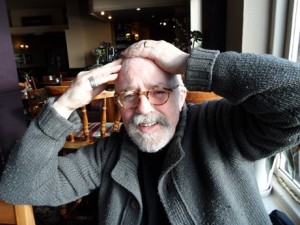A lesson in poetry-writing
Chris Allinson, a master in portraiture (paint) and Haiku (brevity) took me to the excellent Bridge Inn at Shoreham-by-Sea (“fresh local fish”, lively mixed crowd), and put my hat on straight about my “poetry”. Please note my quotation marks. He said something like, “I like your stuff about Alfie and Bernardine Bishop, but it’s not really poetry”. Before I got upetty, he smoothly proceeded, “You ought to be looking at Haibun”.
Accordingly, Chris lent me books of Haibun by David Cobb (Spitting Pips, 2009, Equinox Pess) and Stanley Pelter (2009, George Mann Publications) . In the latter, John Daniel writes a useful exploration of the tradition, evolution and purpose of the Haibun form.
As I gather it from reading a little Haibun, and Mr Daniel, and listening to Chris Allinson, this is how the form works. One produces a stream of
prose (sometimes called a “narrative of epiphany”) into which Haiku are inserted, or rather, in which they emerge, as more intense and obviously poetic moments. So the prose-stream is not straight prose and the Haiku doesn’t sit quite so gnomically, or so epigrammatically, on its own as raw poetry. I suppose the Haiku might be seen as the main event of the Haibun, But it’s left open whether the prose element of the Haibun explains the Haiku or the Haiku informs the prose. (Tenku comes into this story somewhere, and I’ll be checking that out.)
If all this works for my stuff, I will have solved a problem which has worried me. I see that my “poetry” seldom bends language and reason as much as I think poetry should, but I quite like working in the way I have been. If I treat it as Haibun, I have the opportunity to “mine” the prose-poems with more intensely poetic moments. These can be retro-fitted, as I ponder the poems at leisure.
I am minded to write a Haibun memoir and also maybe a Haibun novel. I suppose in old-money (and in better hands), such ventures would be called epic poems or narrative poems. In my mind they might satisfy my longing to be some sort of poet, fiction-writer and memoirist. And also, they seem to sit well with my interest in being a performer (I could declaim these beggars) and also illustration. I think my Haibun might stand to poetry the way illustration stands to painting.
Anyway, that’s where I’ve got so far.



Leave a comment